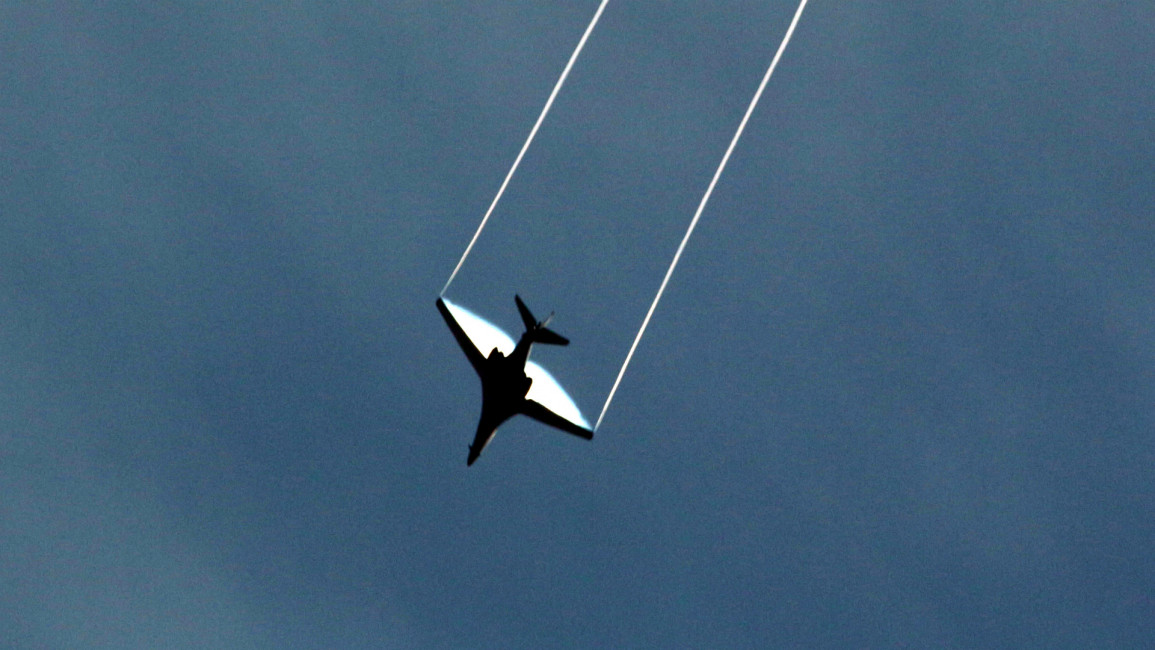US relax rules on bombing IS in civilian areas
US relax rules on bombing IS in civilian areas
Lower-ranking US officers operating in Iraq and Syria no longer need authorisation from US Central Command to carry out certain air raids in civilian areas.
2 min read
Commanders will consider the likelihood of civilians being killed when approving an airstrike. [Getty]
Military commanders tasked with leading US efforts to fight the Islamic State group will no longer need the approval of higher-ranking officers to order air strikes even if such raids put civilian lives at risk.
US officials in Baghdad said the decision will help the coalition hit IS leaders.
Previously, Iraq-based officials would need approval of a four-star commander at US Central Command (CENTCOM) headquarters in Tampa, Florida to conduct airstrikes in areas where civilians are at high-risk of being killed.
"This does not translate to more civilian casualties," Army Colonel Steve Warren, spokesman for Operation Inherent Resolve - as the US-led coalition's mission is called - said at the briefing.
Commanders will consider the likelihood of civilians being killed when approving an airstrike. This is referred to by the military as the "non-combatant value" of a target with a score of zero given where civilians have no chance of being hit.
In the midst of a fast-moving campaign, getting CENTCOM approval for repeated airstrikes against similar target set-ups (for example, oil trucks) can get in the way of hitting a prime target.
"It's levels. It's how many civilians we believe are potentially at risk," Warren said. "The most complex and potentially deadly strikes, approval from the CENTCOM headquarters may still be required."
However, depending on the case, final decision may rest with Army Lieutenant General Sean Macfarland, or lower-ranking officers.
The announcement comes after Iraqi government forces and Kurdish militias began to recapture territories from IS over the past six months.
US officials made the public statement after this policy was brought to light in a USA Today report in the beginning of the week.
Since last October, the US has focused on mounting more raids to capture or kill IS leaders and add pressure to Raqqa, Syria, IS' self-proclaimed capital.
As the Iraqi army plans its advance to Mosul - a densely populated IS stronghold - US close-air support will likely reignite discussions about the acceptability of civilian causalities.
The department of defence has said that it has killed at least 26 civilians in the air campaign and dropped 40,000 bombs.
Experts believe the death toll is a massive understatement.
The US-led coalition air campaign has massively intensified over the past year, with 3,227 bombs dropped in November 2015 - the record for a single month.
This month, the US deployed B-52 bombers for the first time since the 1991 Gulf War - with bombers conducting their first air raid on Wednesday - and committed an additional 217 US troops and Apache helicopters to the campaign.
US officials in Baghdad said the decision will help the coalition hit IS leaders.
Previously, Iraq-based officials would need approval of a four-star commander at US Central Command (CENTCOM) headquarters in Tampa, Florida to conduct airstrikes in areas where civilians are at high-risk of being killed.
"This does not translate to more civilian casualties," Army Colonel Steve Warren, spokesman for Operation Inherent Resolve - as the US-led coalition's mission is called - said at the briefing.
Commanders will consider the likelihood of civilians being killed when approving an airstrike. This is referred to by the military as the "non-combatant value" of a target with a score of zero given where civilians have no chance of being hit.
In the midst of a fast-moving campaign, getting CENTCOM approval for repeated airstrikes against similar target set-ups (for example, oil trucks) can get in the way of hitting a prime target.
"It's levels. It's how many civilians we believe are potentially at risk," Warren said. "The most complex and potentially deadly strikes, approval from the CENTCOM headquarters may still be required."
However, depending on the case, final decision may rest with Army Lieutenant General Sean Macfarland, or lower-ranking officers.
The announcement comes after Iraqi government forces and Kurdish militias began to recapture territories from IS over the past six months.
US officials made the public statement after this policy was brought to light in a USA Today report in the beginning of the week.
Since last October, the US has focused on mounting more raids to capture or kill IS leaders and add pressure to Raqqa, Syria, IS' self-proclaimed capital.
As the Iraqi army plans its advance to Mosul - a densely populated IS stronghold - US close-air support will likely reignite discussions about the acceptability of civilian causalities.
The department of defence has said that it has killed at least 26 civilians in the air campaign and dropped 40,000 bombs.
Experts believe the death toll is a massive understatement.
The US-led coalition air campaign has massively intensified over the past year, with 3,227 bombs dropped in November 2015 - the record for a single month.
This month, the US deployed B-52 bombers for the first time since the 1991 Gulf War - with bombers conducting their first air raid on Wednesday - and committed an additional 217 US troops and Apache helicopters to the campaign.



